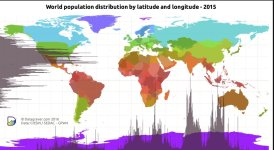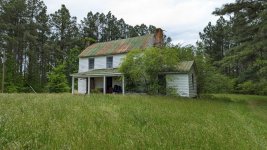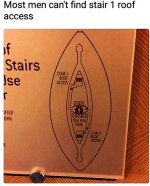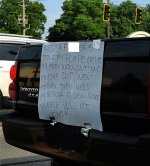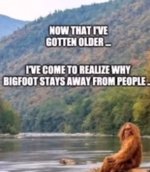I saw that one the other day and it really hit home for me.
I spent summers with my grandparents on their little farm. Actually it wasn't their farm, as they were sharecroppers.
This house had no air conditioning, one cold water only indoor faucet, and no indoor bathrooms.
My grandfather farmed 3 acres of tobacco of his own and took care of the owner's fields in trade for rent.
They also sold some milk and eggs to supplement their very meager income.
They raised hogs that were fed table scraps and corn grown in the field, planted by mule and hand, and harvested by hand.
They had three gardens in which they grew vegetables, and of course they canned and froze to sustain them through the winters.
There was no tractor. Just a mule.
When my grandfather was about 65 a mule freaked out on him when a horse drawn buggy came by, and he got dragged down a gravel road maybe 200 yards or so. That was the first time he'd spent a night in the hospital in his life. It might have been two nights.
When I was 14 he was about 73 and still working side by side with me all day, sunrise to sunset, in the fields.
I watched him treat poison ivy by scrubbing the rash on his arms with a red dirt clod from the field. The next day it was drying up and scabbing over.
My dad was born in that hose in late July 1930.
Every summer the local news lists the record heat dates for those middle and last few weeks of July, and it's always 1930.
100-105 with insane humidity. Imagine a woman carrying a child to full term in that, and then giving birth at home, all while taking care of the household chores, cooking on a wood-fired stove, and probably canning vegetables and feeding his older sister in that kind of heat.
I remember the days being so hot, but if the temperature got below 80 at night it felt like the AC was on.
After he passed and she moved in with my aunt, the house became the place to house the immigrant laborers.
It was deemed unfit for them, so they had to install full indoor plumbing with hot water, upgrade the electricity, and dig a new well, instead of pumping water up from the spring in the wooded bottom behind the house.
Air conditioners were installed so the migrants could sleep and spend their off hours in comfort.
The migrants are long since gone now, and the place is slowly falling back into the land, but I still stop by now and then, just to remember some of the best days of my life.
It was a big house when I was a kid. Now it seems tiny.
My room was the single story one on the RH side of this picture.
The giant oaks that offered sanctuary from the blazing summer heat are now gone.
I have a handful of things that I have picked up in my visits, and I have my grandfather's old change purse from when he passed, and the few coins that were in it.
I never knew they were poor.
I don't think they did either. They never mentioned it.
They just talked about how good life was and about God's blessings.
View attachment 390014

